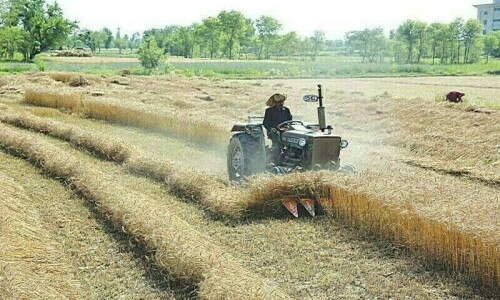• Biden wants Group of Seven, Nato not to splinter
• US, UK, Canada, Japan ban Russian gold exports
• Macron warned against ‘settling’ war now
ELMAU CASTLE: US President Joe Biden announced on Sunday a G7 project to rival China’s Belt and Road Initiative (BRI) by raising some $600 billion for global infrastructure programme in poor countries.
“Together with G7 partners, we aim to mobilise $600 billion by 2027 in global infrastructure investments,” the White House said shortly ahead of a speech by Biden unveiling the proposal.
Unlike the Chinese version, reliant on state-controlled funds and companies, Biden said the US and other G7 governments would only provide limited amounts of money, while incentivising massive private sector investments.
Between now and 2027, the US government will shoot for the $600-billion figure “through grants, federal financing, and leveraging private sector investments,” the White House said.
“This will only be the beginning: the United States and its G7 partners will also seek to mobilise hundreds of billions in additional capital from other like-minded partners, multilateral development banks, development finance institutions, sovereign wealth funds, and more.”
At a meeting ahead of the G7 summit in the German Alps, Biden on Sunday praised Germany’s Chancellor Olaf Scholz for his leadership in the wake of Russia’s war against Ukraine and urged the West to stay united.
“We have to stay together,” he told Scholz. Russian President Vladimir Putin had been hoping “that somehow NATO and the G7 would splinter,” Biden said. “But we haven’t and we’re not going to.”
Biden met his German host in the picturesque Elmau Castle where the Group of Seven — Britain, Canada, France, Germany, Italy, Japan and the United States — was holding a three-day summit dominated by the crisis in Ukraine.
“I want to compliment you for stepping up as you did when you became chancellor” and “the way you had a great impact on the rest of Europe to move, particularly relating to Ukraine,” Biden told Scholz.
Their talks Sunday were “a good opportunity to affirm the deep and enduring ties between our two countries. In terms of the meeting agenda, expect that Russia and Ukraine are going to be at the top of the list, including our continued close coordination on the political and diplomatic front,” a senior US official said.
Gold export ban
As leaders of the Group of Seven wealthiest nations were meeting in the Bavarian alps, with their talks to be focused on how to sustain backing for Ukraine against Russia’s invasion, British Prime Minister Boris Johnson said the joint action taken by Britain, Canada, Japan and the United States to ban Russian gold exports “will directly hit Russian oligarchs and strike at the heart of (President Vladimir) Putin’s war machine”.
Given London’s central role in the international gold trade and parallel US, Japanese and Canadian action, “this measure will have global reach, shutting the commodity out of formal international markets,” Britain said.
Worth 12.6 billion pounds ($15.5 billion) to the Russian economy in 2021, gold is a major export for the country.
The G7 is expected to take stock of how unprecedented sanctions taken against Moscow have worked so far, discuss further financial and military aid for Ukraine, as well as look at longer reconstruction for the war-torn country.
Caution against settling war
Meanwhile, British PM Boris Johnson and French President Emmanuel Macron said on Sunday that they saw an “opportunity to turn the tide” in Ukraine, as London warned against trying to “settle” the conflict now.
A Downing Street spokesman said the leaders, meeting at the G7 summit in Germany, “agreed this is a critical moment for the course of the conflict, and there is an opportunity to turn the tide in the war”. But Johnson also cautioned Macron that “any attempt to settle the conflict now will only cause enduring instability”.
It also risked giving Russian President Vladimir “Putin licence to manipulate both sovereign countries and international markets in perpetuity,” Johnson warned, according to the spokesman.
Published in Dawn, June 27th, 2022















































Dear visitor, the comments section is undergoing an overhaul and will return soon.